- Home
- Barry Lyga
Game Page 21
Game Read online
Page 21
Oh, God, she thought, and touched her chest, feeling her heart race exactly as it had just now in the dream. Oh, thank God.
“Look who’s joining us for breakfast on a Saturday,” Mom said, pleased, when Connie appeared in the kitchen. The rest of the family was already there at the table, Dad wearing a tie, which meant he had to go into the office even though it was a weekend. Ugh. The only work Connie ever wanted to do on a weekend was a Sunday matinee performance on Broadway.
“You’re quiet this morning,” said Dad as she poured milk over her cereal.
“She’s tired from sneaking around the house all night,” Whiz said helpfully. Connie shot him a dirty look.
“What’s this?” Dad asked, clearing his throat and suddenly taking tremendous interest in his daughter. “Sneaking?”
“Something woke me up,” she lied. “I thought I heard something, so I went to check on Whiz.” She glared at him. “I should have let the boogeyman take him.”
“I’ll show you boogies!” Whiz cried, and went for his nose with one finger.
“Wisdom!” Mom said sharply. “If you stick that finger in your nose, you will lose it, do you hear me?”
Whiz shrugged and dove back into his scrambled eggs. He insisted on eating them topped with a nauseating concoction of ketchup, mustard, and soy sauce.
“What did you think you heard?” Dad wouldn’t let it go.
Connie made a show of being exasperated, even though the direction of the conversation petrified her. Did Dad know she’d sneaked out the previous night? “I don’t know. Something. It was probably a dream. Or the house settling. Or the wind.”
Dad hmphed and checked his watch. That would be one parent out of the way. Mom worked at the Tynan Ridge branch of the state university, and they never called her in on weekends. Connie had to get her and Whiz out of the house so that she could escape. Howie had tormented her earlier this morning with a text that said Ready?, accompanied by a picture of himself standing in overalls, propping up a long-handled shovel like the farmer in Grant Wood’s American Gothic.
After Dad was gone, Connie slipped into Whiz’s bedroom, where he busily slaughtered something vaguely dragonish on his Xbox.
“I need a favor,” she said.
Whiz ignored her. He was good at that when he wanted to be.
She tried again. “I need your help. I need you to get Mom to take you to the mall.” The nearest mall was a half-hour drive away. Connie would prefer that Mom be gone all day, giving her a chance to get out, dig, and come back before being missed. But if Mom just dropped Whiz off and came home, it would still give her plenty of time to get out of the house, cover her tracks, and contemplate the punishment her father would eventually visit upon her.
“I don’t want to go to the mall,” Whiz said, aiming and swiping his on-screen sword with scary precision. Connie idly wondered if Billy Dent had ever owned an Xbox.
“Sure you do. There’s that new movie—”
“Already saw it.”
“And you want to see it again.”
Whiz hit Pause and assessed his sister craftily. “What do you want?”
“I just told you—I want you and Mom out of the house.”
“So that Jazz can come over and you guys can do the nasty?”
Jeez, even my kid brother thinks we’re ready, Jazz! “No. Jazz isn’t even in town. I just need to do some stuff. And I can’t have you guys around.”
“What’s in it for me?” Whiz said, his tone clearly conveying that he knew she had nothing to offer him for such a favor.
Connie drew in a deep breath and played her best card.
“I’ll show you the code to unlock the parental controls on the satellite box,” she said.
Whiz’s eyes grew wide with something akin to worship.
CHAPTER 32
There were two interrogation rooms, one on either side of the observation room. While one suspect was being questioned, the next one would wait in the other room. The observers could look in on either one, and as the day crawled along, Jazz started to feel dizzy as he rotated between the two.
As the morning dragged into a cigarette-stale afternoon, Hughes and Morales ran their good cop/bad cop on four more suspects, all of whom fit the profile in various ways. It was a parade of white guys in their mid-thirties, all of them leading lives of depressingly similar dissatisfaction, all of them as empty as overpumped wells.
It took its toll on the people in the observation room, who’d begun the day with verve and excitement and a sense that New York’s months-long nightmare was one confession away from ending. But as the day wore on, observers drifted out, replaced by others who watched for a little while, then left again as it became obvious to everyone that the guy in the box wasn’t The Guy. Only Jazz and Montgomery stayed the whole time, the captain settling into a chair next to Jazz and leaning forward, elbows on knees, looking for all the world like a baseball manager trying to wish his team into the playoffs.
Jazz’s phone rang in the middle of one interrogation, earning him a nasty glare from just about everyone in the room. He could have sworn he heard one of the loaner FBI agents mutter, “What makes him so special?” to another agent. The caller ID showed Connie’s face, but Jazz fumbled to turn off the ringer, failing miserably. Finally, after what seemed like hours of that damn phone ringing, a cop grabbed it from him, pressed a few times, and shoved it back in his hands, silent and dark.
“Next up,” Montgomery announced, reading off a sheet of paper like it was a scorecard, “is Mikel Angelico. That’s M-I-K-E-L for those of you playing at home. White male—”
“Go figure,” a cop said, to general laughter.
“—twenty-eight years old. Currently unemployed—”
“Say it ain’t so, Cap’n!” someone called out.
Montgomery sighed like a father with newborn triplets who all needed fresh diapers at the same time. “No one’s making you stand here, Wizniewski. There’s boxes of documents need stacking over in the copy room.”
“Sciatica, Cap,” Wizniewski said.
“Christ,” Montgomery muttered. Jazz had just opened his mouth to shoot down Wizniewski—he was tired, the cop was an ass, why not?—when the door to the observation room burst open and a youngish uniformed cop said, “Captain! Captain! You’re not gonna believe this!”
What they wouldn’t believe was Oliver Belsamo.
“And he just walked into the precinct?” Montgomery clarified.
The cop who had burst in—Amelio, his nameplate read—nodded. “Yessir. Walked in, ignored all the stuff out there, sat on the bench. He was waiting for a while. Noticed him right away, but he didn’t say anything, just sat there, kinda twitchy, so I kept an eye on him and then—just now—he finally came right up to the front desk and said, ‘I saw that story in the paper. I need to talk to someone about all the dead people.’ ”
Montgomery raised an eyebrow as he glanced at Jazz.
“You ran the fake-witness sting, didn’t you?” Jazz asked. The expression on Montgomery’s face was enough of an answer. “Awesome. And now this guy is coming in—”
“Doesn’t mean he did it,” the captain cautioned, trying to calm not just Jazz but also the half-dozen cops, FBI agents, and shrinks in the room with them. “Could just be a nutbar. Could be looking for publicity.”
“What should I do with him?” Amelio asked.
Montgomery shared another look with Jazz. Jazz tried to dial down his excitement but was afraid it came through anyway, his best efforts to the contrary. Yeah, it was true that this “Belsamo” guy probably had nothing to do with the murders. Probably thought he saw something or was just looking for attention. Happened all the time. And thank God for it, Billy crowed. More chaff in the radar! More fog in the air!
“I say we at least talk to him,” Jazz said, fully aware that at least half the room didn’t care what he thought.
Montgomery nodded as though that had only confirmed his own feelings. “Set him up in room
two, and get Hughes and Morales over there.”
Hughes and Morales soldiered on. Jazz was impressed with their stamina. Hughes had been playing the pissed-off, barely-in-control black guy all day long, but still managed to drop in a joke or two between suspects. Morales had had to pretend to keep her partner in check and had taken her hair down and put it back up so many times that she didn’t even glance over in the mirror now as she once again bunned up in preparation for the next suspect.
“Here’s what Amelio got on intake,” Montgomery said, and read off a blurt of stats on the walk-in: Belsamo, Oliver M. Thirty-two. White. Divorced. No kids. Currently unemployed.
They all clustered at the appropriate window for their first look at Belsamo, who was unshaven and dressed in a ratty old denim jacket. His fingernails were dirty; his eyes shifted around the room. The guy looked homeless.
He looks too crazy to be Hat-Dog. Hat-Dog would pass for normal. This guy can’t.
Then again… then again, maybe he knows that’s what we think, and he’s playing us….
Being in a serial killer’s mind was like navigating a maze made out of mirrors.
Hughes and Morales strode into the interrogation room as though they’d just come from an hour’s beauty sleep. Hughes did his growly thing. Morales did her “Can I get you some water?” thing. Belsamo declined. They settled in.
“What can we do for you today, Mr. Belsamo?” Morales asked politely. Going with the good cop first.
He shrugged.
“We can’t really help with shrugs,” she said, putting some joviality into it.
“Saw the paper. Said there was a witness.”
“That’s right,” Morales said, as Hughes did his best seething-with-rage act. “Someone saw the man who killed Lucy Donato. Do you know something about that?”
Belsamo shrugged again. Morales pressed some more, gently, not about Donato specifically. Harmless questions. He answered in mumbles and whispers. He kept looking around the room, startled, as though ghosts tapped his shoulders.
“You really think this guy could have planned and executed those murders?” Jazz asked. He regretted saying it as soon as the words were out of his mouth. Masks.
“I don’t know,” Montgomery admitted. “Could be playing us.”
“Think he’s on something?”
“Maybe.”
“… Elana Gibbs,” Morales said gently, bringing the subject back to the murders. “Did you know her?”
Belsamo said nothing.
Didn’t even shrug this time.
“Hey!” Hughes shouted suddenly. “Hey, you need to talk to us, you understand?” It was a flat-out lie. Belsamo wasn’t under arrest. And even if he had been, he could have pled the Fifth and clammed up.
“I don’t want to,” Belsamo mumbled. “I don’t want to talk about that girl.”
An electric spark ricocheted around Jazz’s heart. Holy…
“Why not?” Morales asked pleasantly. “She was a pretty girl.” She slid a photo of Gibbs across the table, taken from some online dating site. “We can talk about her. It’s okay.”
Belsamo’s eyes flicked at the picture, then flicked away.
“Holy crap,” breathed Montgomery, now leaning forward so much that he was almost a street urchin at a bakery window.
Despite himself, Jazz leaned forward, too. Belsamo didn’t seem the type, but still… he’d reacted—a small reaction, true, but a reaction nonetheless—to the picture. Now Hughes should—
“How about this picture?” Hughes asked belligerently, sliding another photo over. “You prefer this one?”
It was a crime-scene photo. Elana Gibbs lay in repose, slit from pubis to breast, her abdomen an open, empty wound.
Belsamo reacted. He swallowed and shook his head, looking away. “Don’t show me that. I didn’t want that.”
Didn’t want that? “That’s a confession!” Jazz whispered excitedly. “Right?”
“No,” said Montgomery. “He could always claim he just meant he didn’t want to see the picture. But it means we’re on the right path.”
“Why didn’t you want it?” Morales asked calmly. “You mean you didn’t want to hurt her?”
“Or maybe she’s just an it to you,” Hughes snarled. “Maybe you mean you got tired of it, so you threw it away like trash. Is that it?”
Belsamo shook his head violently. “Stop it. Stop talking to me.”
“We’re just talking,” Morales soothed. “It’s just talk.”
“If you talk to me, I have to talk to you, and I don’t want to talk to you!” Belsamo yelled. For an instant, Jazz thought the man would snap, would make a move. But he calmed as quickly as he’d flared, slumping in his seat again. He started picking at the dirt under his fingernails.
A glance between Hughes and Morales. Morales nodded a minute nod. She took over.
“Why don’t you want to talk to us, Oliver?” She slid her chair a little closer, her voice pitched low and comforting. She did everything but take his hand in hers. “Are you afraid of what you might tell us?”
Belsamo shrugged.
“I’ve heard a lot of things, Oliver.” Using his first name. Familiar. Comforting. “I’ve heard a lot. I can handle it. You can tell me whatever you want. This is a safe space. I know you have something to tell me. This is the place. This is the time.”
“Please stop asking,” Belsamo whispered. Montgomery turned up the volume on the speaker from the interrogation room.
“Why? Because you’ll tell me?”
Another shrug.
“You’ll tell me, won’t you, Oliver? You’ll tell me, and you’ll tell me the truth, right? Because you wouldn’t lie to me.”
“I don’t lie,” Belsamo said, with something like pride.
“That’s good. Because you know what’ll happen if you lie to us, don’t you? If you tell us something that’s not true?”
Belsamo contemplated this for a moment, still picking at his fingernails. “I know what will happen,” he said in a low, barely audible voice. “I’ll go to jail.” Then, more strongly: “I’ll go directly to jail.”
“Well, maybe not directly. It might take a little while. But, yeah, you’ll go to jail if you don’t tell the truth.”
“It’s time to open up,” Hughes said in a kind tone, sensing the moment. He pushed the two pictures a little closer. “It’s time to tell us.”
Belsamo sighed, his entire body crumpling and deflating like yesterday’s balloon. “Yeah. I know.” He cleared his throat and pointed to the pictures. “I did it. I killed her.”
Jazz’s heart pounded. Montgomery swore softly under his breath.
“You killed her,” Morales said, her voice controlled and soft. “Just her?”
For a moment, it seemed as though Belsamo did not understand the question. Struggle writhed his features, twisted his lips, and crunched his eyebrows together. But finally he shook his head.
“How many?” Hughes asked. Flat. No expression on his face. No judgment. No excitement. How many?
“A bunch of them,” Belsamo went on. Pause. Then, as if helpless to stop himself, gathering steam: “I killed them all.”
CHAPTER 33
The precinct dropped its pretense of studied, methodical calm and fell right into chaos. As Jazz emerged from the observation room, he felt as though he’d stepped into an evacuation drill. People ran in every direction. Phones blared.
Hughes slid out of the interrogation room, his eyes shining and bright and alive. “Did you hear that? Were you in there? Did you hear that?”
“Yeah.” Jazz accepted a sudden and unexpected bear hug from the detective, who trembled with what Jazz could only assume was joy. Or maybe a massive overload of adrenaline.
“I mean, it’s not definite,” Hughes went on. “He sort of clammed up right away, like he realized what he’d said. And people confess to crap they didn’t do all the time, especially in this city, where the crazy quotient is ridiculous, but—”
�
��Hughes—”
“—I just have a feeling, you know? He just feels right for it.”
“Hughes, he doesn’t fit the profile.”
Hughes released Jazz and stepped back. “Yeah,” he said, looking for all the world like a toddler whose birthday party has just ended. “I know. I know that. But—”
“I’m just saying. Not married. No kids. No serious relationship at all. A loner. And look at him. Did you really look at him? The hair? The dirty nails? He’s not organized enough to take a shower or wash his hair—how do you expect him to be organized enough to pull off the Hat-Dog murders?”
Hughes frowned. “He confessed. You weren’t in the room. You didn’t see the way he reacted when we showed him the crime-scene photo.”
“I saw. I was watching.”
A head shake. “No, man. It was different, in the room. Ask Morales.”
As if summoned by her name spoken aloud, the FBI agent emerged from the interrogation room, grabbing another FBI guy to say, “I want an NCIC check on this guy ASAP. Get a medic down here right now. I’m getting a court order for his blood, and as soon as it gets here, I want that blood out of him and in a lab.”
“Is he under arrest?” Jazz said, and then felt stupid for asking.
But Morales shook her head. “No. Once he’s in custody, I have to read him his rights. If he babbles something else in the meantime, I want it to count. Once the court order for his blood gets here, we’ll make it official and take him into custody, Mirandize him, all that.” She shouted at the other agent, who apparently wasn’t moving quickly enough for her. “Get on the damn phone and get that medic! I want a DNA match to the blood and semen samples yesterday, got it?”
“How long until we know?” Jazz asked her.
Morales clucked her tongue. “It’ll take maybe an hour to get the court order, depending on how quickly we can find a judge on a Saturday. Shouldn’t be that tough, though. I’m going to put the highest possible priority on this.”
“And then…”

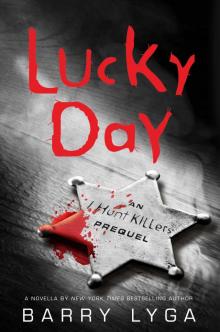 Lucky Day
Lucky Day Hero-Type
Hero-Type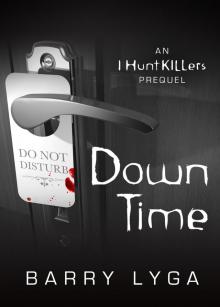 Down Time
Down Time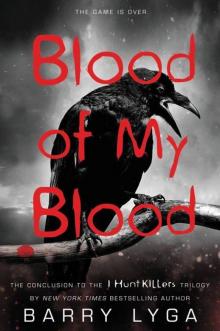 Blood of My Blood
Blood of My Blood Goth Girl Rising
Goth Girl Rising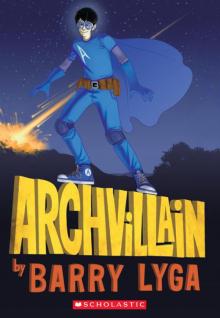 Archvillain
Archvillain Boy Toy
Boy Toy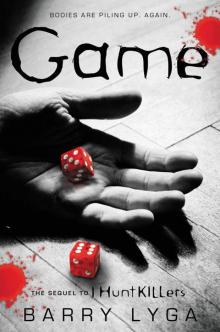 Game
Game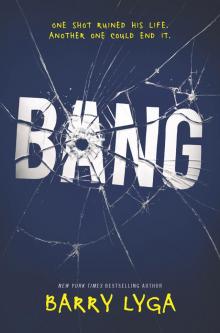 Bang
Bang The Legends of Forever
The Legends of Forever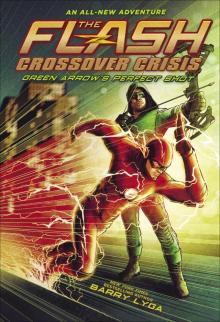 The Flash: Green Arrow's Perfect Shot
The Flash: Green Arrow's Perfect Shot The Flash: The Tornado Twins
The Flash: The Tornado Twins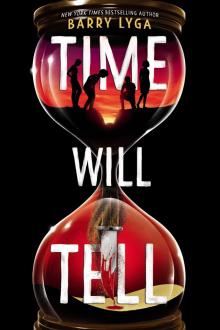 Time Will Tell
Time Will Tell The Secret Sea
The Secret Sea The Hive
The Hive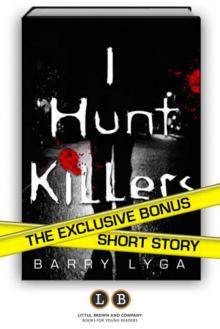 Career Day
Career Day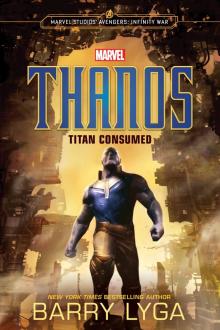 MARVEL's Avengers: Infinity War: Thanos
MARVEL's Avengers: Infinity War: Thanos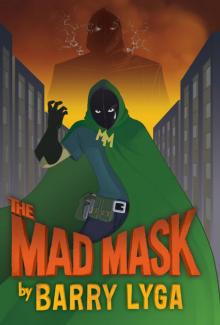 The Mad Mask
The Mad Mask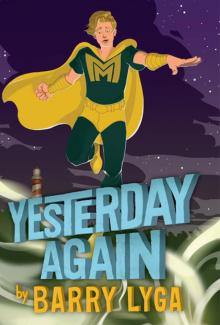 Yesterday Again
Yesterday Again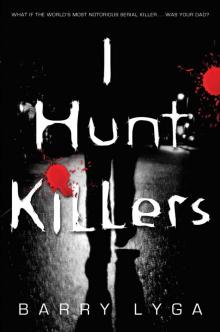 I Hunt Killers
I Hunt Killers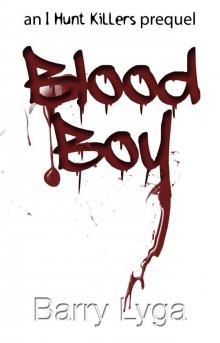 Blood Boy
Blood Boy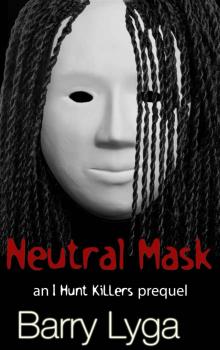 Neutral Mask
Neutral Mask The Astonishing Adventures of Fanboy and Goth Girl
The Astonishing Adventures of Fanboy and Goth Girl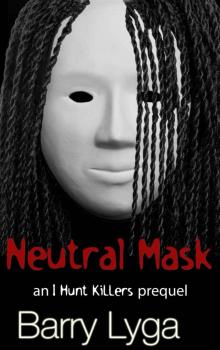 I Hunt Killers Neutral Mask
I Hunt Killers Neutral Mask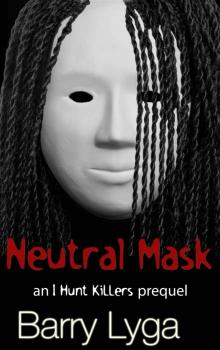 Neutral Mask: an I Hunt Killers prequel
Neutral Mask: an I Hunt Killers prequel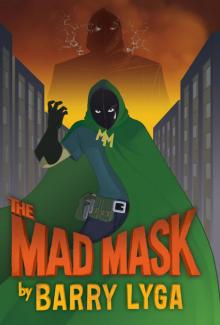 Mad Mask
Mad Mask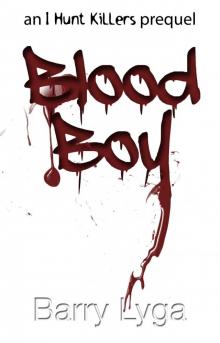 Blood Boy: an I Hunt Killers prequel
Blood Boy: an I Hunt Killers prequel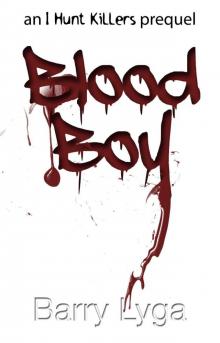 I Hunt Killers Blood Boy
I Hunt Killers Blood Boy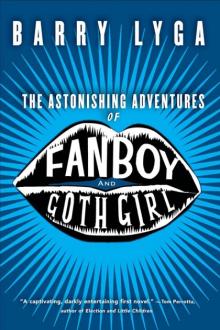 The Astonishing Adventures of Fan Boy and Goth Girl
The Astonishing Adventures of Fan Boy and Goth Girl